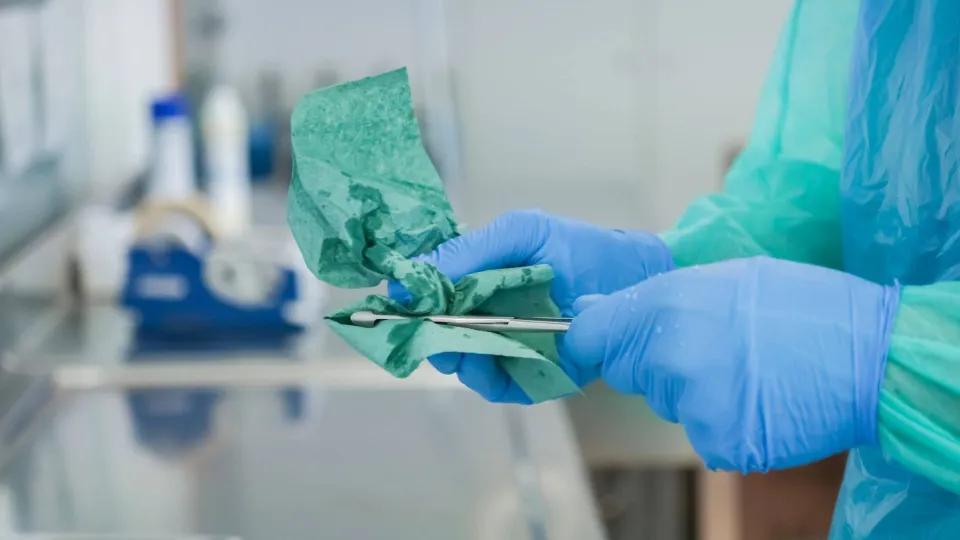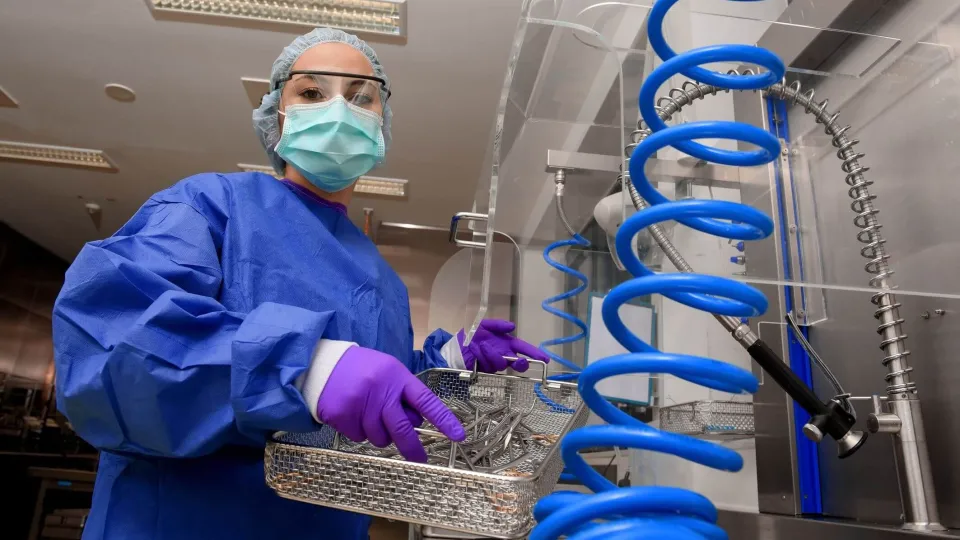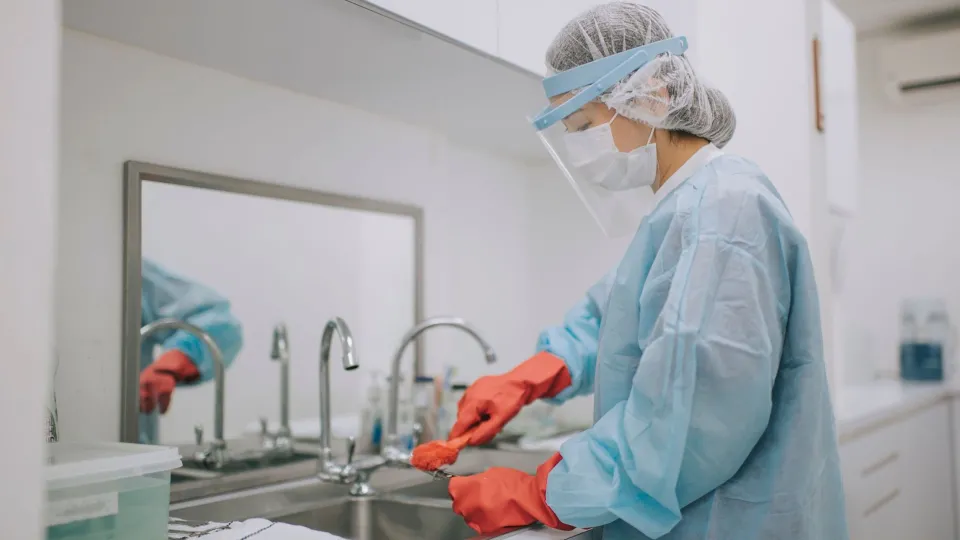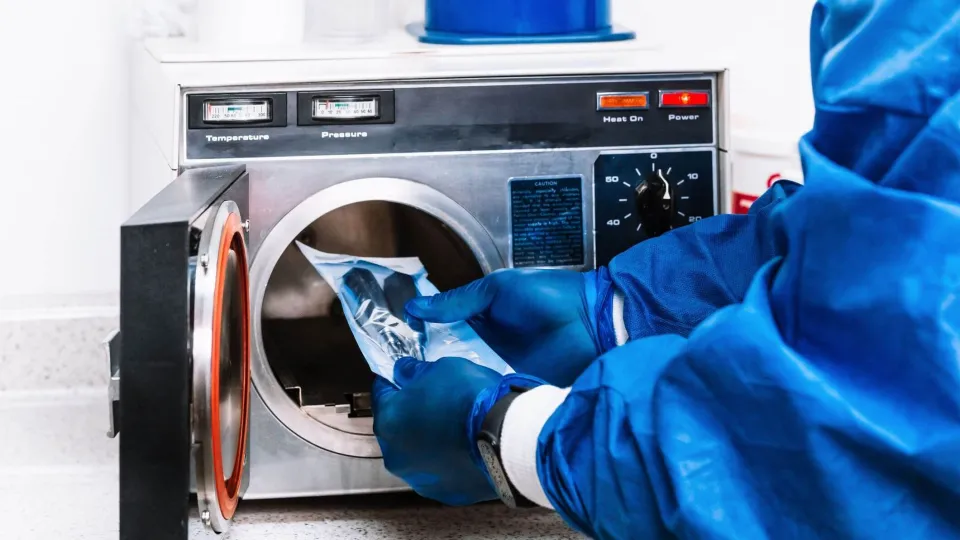
The work of sterile processing technicians contributes to the prevention of infections, and without this crucial work, surgeries might be unsafe to perform. As the number of surgeries increases globally, so does the demand for sterile processing technicians. Let's explore the role and how to become a sterile processing technician, including the requirements for passing the Certified Registered Central Service Technician's exam.
What Is a Sterile Processing Technician?
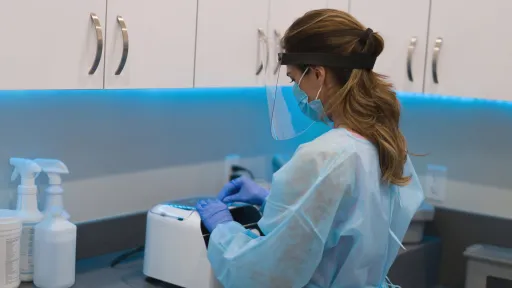
Sterile processing technicians clean, disinfect, and sterilize medical equipment. These health care technicians mainly work in hospitals but can work in dental offices, outpatient care facilities, and other health care services. According to the Centers for Disease Control and Prevention, one in 31 hospital patients contracts an infection associated with their health care, highlighting the importance of sterile processing technicians in reducing these figures. Their primary responsibilities include:
- Decontamination: cleaning medical equipment by hand using enzymatic cleaners and specialized tools
- Inspection: examining instruments for damage and wear and testing for functionality
- Tray assembly: placing clean instruments in specialized trays for delivery to the sterilization facility
- Sterilization: sterilizing at high temperatures with steam or using a hydrogen peroxide bath to destroy microbial life on surgical instruments
- Storage: transferring instrument trays to a strictly maintained controlled environment to avoid contamination
- Distribution and control: recording all sterilization procedures, inventory, and instrument distribution to ensure that instruments spend minimal time in storage
Job Responsibilities
Sterile processing technicians play an important role in maintaining a sterile environment in healthcare settings. Their day-to-day responsibilities in sterile processing ensure that surgical instruments and medical equipment are clean, sterile, and ready for use. Day-to-day tasks include the following:
- Cleaning and sterilizing instruments: Sterile processing technicians carefully clean, disinfect, and sterilize medical tools and equipment using specialized machines and chemicals. Proper sterilization helps prevent infection and maintains the safety of both patients and healthcare professionals.
- Maintaining sterile supplies: These healthcare professionals are responsible for keeping an inventory of sterilized equipment, ensuring that sufficient supplies are available for medical procedures. This includes tracking usage, reordering supplies, and storing items properly.
- Inspecting and testing equipment: Before distributing equipment for use, technicians inspect instruments for cleanliness and functionality. They also monitor sterilization machines to ensure they are operating correctly and that they meet safety standards.
- Preparing instrument trays: For surgical procedures, sterile processing technicians organize and prepare instrument trays according to the needs of surgeons or healthcare teams, ensuring everything is in place for seamless operations.
- Following infection control protocols: Adhering to strict infection control guidelines is essential to prevent contamination. This includes properly disposing of medical waste, maintaining clean workspaces, and following safety protocols.
- Disposing of medical waste: Sterile processing technicians remove and properly dispose of medical waste, ensuring a safe and sanitary healthcare environment.
- Recordkeeping: They track the sterilization process, document equipment use, and maintain detailed records to ensure compliance with healthcare regulations.
- Delivering medical materials: Technicians also transport sterilized equipment to various departments within the healthcare facility, ensuring that medical professionals and surgical teams have the tools they need.
Related: The Role of Sterile Processing in Health Care Facilities
Required Skills and Qualities

To excel as a sterile processing technician, the following skills and qualities are essential:
- Attention to detail: Sterile processing technicians must carefully inspect and clean surgical instruments. Even a minor oversight could lead to infection risks for patients.
- Knowledge of sterilization techniques: A strong understanding of various sterilization processes is vital for ensuring all equipment meets safety and cleanliness standards.
- Understanding of medical terminology: Familiarity with medical terms and instruments is necessary to properly handle, process, and prepare equipment for different healthcare settings.
- Ability to work in a fast-paced environment: Sterile processing technicians often work under tight deadlines, especially in busy hospitals. The ability to handle pressure is crucial.
- Strong communication: They must effectively communicate with healthcare teams to ensure proper delivery of sterilized instruments and equipment.
- Meticulous nature: A detail-oriented mentality is an asset when handling surgical instruments, as cleanliness is paramount in this field.
- Passion for working in various medical settings: Adaptability and enthusiasm for different environments promotes job satisfaction.
- Critical thinking and problem-solving: These skills are necessary for troubleshooting equipment malfunctions or addressing urgent needs during medical procedures.
- Basic healthcare skills, including basic lifesaving and CPR: A foundational understanding of healthcare practices is beneficial in emergencies.
- Infection control and prevention knowledge: Understanding infection control practices is essential for maintaining a sterile environment and preventing contamination.
- Inventory management: Keeping track of medical equipment and ensuring sufficient sterilized supplies requires strong organizational abilities.
- Understanding of quality assurance processes: Knowledge of QA measures contributes to maintaining high standards of care
Education and Training Requirements
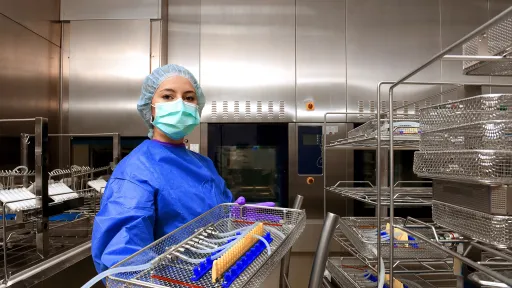
To pursue a career in sterile processing, candidates must have a high school diploma and have completed a formal education program. Concorde Career College offers a diploma program for sterile processing techs. This program provides training in sterilization tactics, ethics, and medical knowledge, including microbiology, anatomy, and physiology. Training includes an 80-hour hands-on sterile processing externship that offers the opportunity for valuable experience. After completing the program, successful students may sit for the Healthcare Sterile Processing Association exam to become a CRCST.
CRCST Certification Process
The CRCST certification process requires applicants to have 400 hours of practical experience in a sterile processing department on a paid or volunteer basis. Concorde's 80-hour externship may count toward this requirement. Candidates need to pass the three-hour CRCST exam comprising 150 multiple-choice questions. The exam covers the following seven specific areas:
- Departmental considerations
- Cleaning, decontamination and disinfection
- Preparation and packaging
- Sterilization process
- Sterile storage, transport, and inventory management
- Patient care equipment and distribution
- Professional development and human relations skills
To pass the exam, students need a 70% grade average. The certification is valid for one year and needs to meet continuing education requirements for annual renewal. The continuing education requirements vary by state but usually include 12 technical credits.
State-Specific Requirements
Some states have specific certification requirements. For example, New Jersey encourages candidates to obtain certification within 12 months of completing their training. This ensures that they can demonstrate their proficiency in sterile processing techniques promptly.
Certification Benefits
Obtaining certification provides the following benefits:
- Better job opportunities
- A solid indication of expertise in the field
Pursue a Career in Sterile Processing
If you're interested in a rewarding career in sterile processing where you can make a difference in keeping patients safe, consider pursuing Concorde's Sterile Processing Technician program which is offered at select campuses. By working hard, it's possible to complete training in as few as five months, which includes 80 hours of externship experience. To succeed in this field, it's important to have proper training, certification, and a genuine commitment to lifelong learning. Take the first step toward a rewarding career in health care by contacting an admissions representative at Concorde.
Frequently Asked Questions
The following are some common questions about sterile processing technicians and their significance.
What are the specific responsibilities of a sterile processing technician in a health care setting?
Sterile processing technicians prepare medical equipment and supplies before procedures and clean and sterilize equipment afterward to ensure patient safety.
How does the work of sterile processing technicians directly impact patient safety?
Sterile processing technicians help prevent infections by cleaning and disinfecting medical supplies and tools after use. Strong attention to detail ensures they prevent the spread of bacteria to patients.
What are the typical educational pathways for becoming a sterile processing technician?
A high school diploma or equivalent and a formal training program or certification. Concorde offers a diploma in sterile processing.
How long does it normally take to complete a sterile processing tech training program?
The exact length varies by program and institution and ranges from 14 weeks to 12 months. Concorde's Sterile Processing Technician diploma program can take as few as five months to complete.
What is the best certification for a sterile processing technician?
The Certified Registered Central Service Technician (CRCST) certification program is the best certification for sterile processing technicians. It recognizes that they have the experience, skills, and knowledge to work in the field.
What are the specific requirements for CRCST certification?
To obtain certification, candidates need to have 400 hours of practical experience within the last five years and pass the exam.
How often do sterile processing technicians need to renew their CRCST certification?
CRCST certification requires annual renewal.
What technical skills are most important for success as a sterile processing technician?
Important skills for sterile processing technicians are technical proficiency, attention to detail, and sterilization techniques.
What soft skills are essential for sterile processing technicians to work effectively in a health care team?
Communication, time management, teamwork, problem-solving, and stress management are all soft skills that contribute to the efficiency of health care teams.
What are the projected job growth rates for sterile processing technicians?
The job outlook for sterile processing technicians is positive. According to forecasts from the BLS, job growth is projected to be approximately 10% from 2024 to 2024.
What advanced certifications are available for sterile processing technicians looking to progress in their careers?
The two main advanced certifications are the CRCST offered by the HSPA and the Certified Sterile Processing and Distribution Technician offered by the Certification Board for Sterile Processing and Distribution.
What are some common challenges for sterile processing technicians in their daily work?
Staffing challenges, inadequate or outdated equipment, insufficient storage space, and noncompliance with regulatory standards are among the most typical problems.
How can sterile processing technicians stay updated with industry standards and best practices?
Technicians can stay current by participating in professional organizations and reading industry publications, as well as continuing their education and earning professional certifications.
Data for Occupations Not Covered in Detail : Occupational Outlook Handbook: : U.S. Bureau of Labor Statistics. (2019, September 19). Bls.gov. https://www.bls.gov/ooh/about/data-for-occupations-not-covered-in-detail.htm#:~:text=Healthcare%20support%20occupations-,Medical%20equipment%20preparers,-Prepare%2C%20sterilize%2C%20install
Jobya. (2024, May 6). Advancement Opportunities for Sterile Processing Technicians. Jobya. https://jobya.com/library/roles/w8s6d5r2/sterile_processing_tech/articles/w8s6d5r2_advancement_opportunities_in_sterile_processing
Medical Equipment Preparers. (2023, April 25). Bureau of Labor Statistics. https://www.bls.gov/oes/2023/may/oes319093.htm
CDC. (2024, November 6). HAIs: Reports and data. Healthcare-Associated Infections (HAIs). https://www.cdc.gov/healthcare-associated-infections/php/data/index.html
Certified Registered Central Service Technician (CRCST). (n.d.). Healthcare Sterile Processing Association. https://myhspa.org/certification/certification-overview/certified-registered-central-service-technician-crcst/
Welcome to Crcstreview | IAHCSMM CRCST exam practice questions. (2024). Crcstreview.com. https://www.crcstreview.com/
CRCST Renewal - Healthcare Sterile Processing Association. (2023, May 23). Healthcare Sterile Processing Association. https://myhspa.org/certification/stay-certified/crcst-renewal/
Take The Next Step Towards a Brighter Future
Interested in learning more about our Sterile Processing program?
We have a Concorde representative ready to talk about what matters most to you. Get answers about start dates, curriculum, financial aid, scholarships and more!

